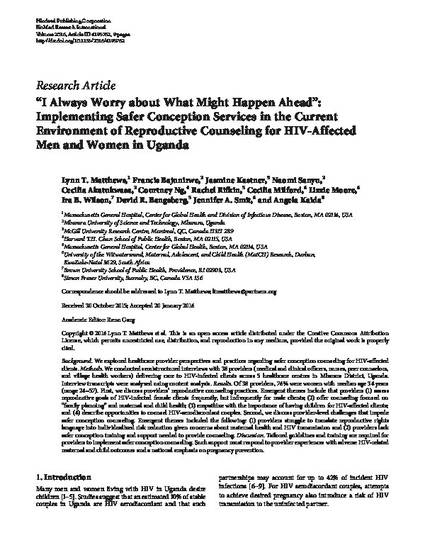
- HIV-positive persons -- Uganda -- Counseling,
- Reproductive health,
- HIV-positive persons -- Ugnada -- Treatment,
- HIV-positive persons -- Uganda -- Social aspects
Background. We explored healthcare provider perspectives and practices regarding safer conception counseling for HIV-affected clients. Methods.We conducted semistructured interviews with 38 providers (medical and clinical officers, nurses, peer counselors, and village health workers) delivering care to HIV-infected clients across 5 healthcare centres in Mbarara District, Uganda. Interview transcripts were analyzed using content analysis. Results. Of 38 providers, 76% were women with median age 34 years (range 24–57). First, we discuss providers’ reproductive counseling practices. Emergent themes include that providers (1) assess reproductive goals of HIV-infected female clients frequently, but infrequently for male clients; (2) offer counseling focused on “family planning” and maternal and child health; (3) empathize with the importance of having children for HIV-affected clients; and (4) describe opportunities to counsel HIV-serodiscordant couples. Second, we discuss provider-level challenges that impede safer conception counseling. Emergent themes included the following: (1) providers struggle to translate reproductive rights language into individualized risk reduction given concerns about maternal health and HIV transmission and (2) providers lack safer conception training and support needed to provide counseling. Discussion. Tailored guidelines and training are required for providers to implement safer conception counseling. Such supportmust respond to provider experiences with adverse HIV-related maternal and child outcomes and a national emphasis on pregnancy prevention.

At the time of writing, David Bangsberg was affiliated with Massachusetts General Hospital, Center for Global Health.
Copyright © 2016 Lynn T. Matthews et al. This is an open access article distributed under the Creative Commons Attribution License, which permits unrestricted use, distribution, and reproduction in any medium, provided the original work is properly cited.